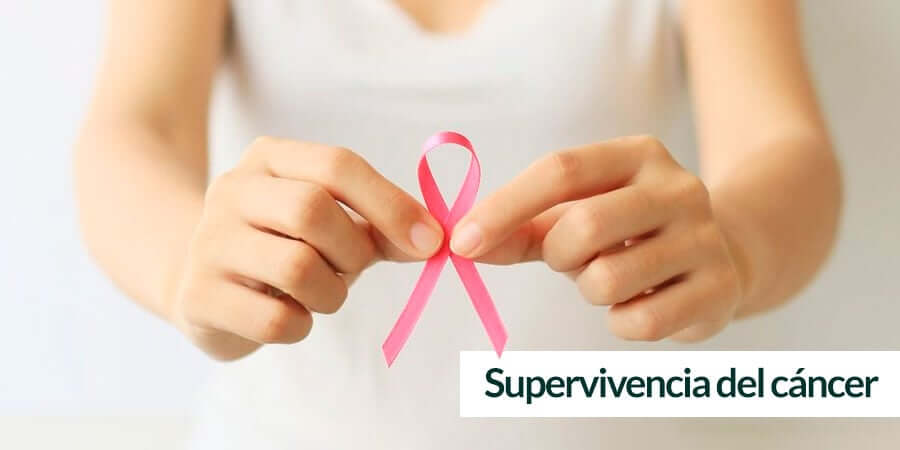
Understanding Cancer Risk Factors and Survival Rates
What does cancer survival mean and which factors influence it?
Cancer survival gives an approximation of the number of people with the same cancer type and stage who are still alive during a period, and that varies according to the type of cancer.
Therefore, in less aggressive cancers a cut-off point of 5 years is used, while in more aggressive cancers, 3 years is the mark; always counting from the moment of the diagnosis.
However, the numbers for each type of tumor are only estimates because they depend on a set of multiple variables to be higher or lower.
In any case, patients must talk to their treating doctor to obtain more accurate data, because they have an in-depth knowledge of each patient and her factors associated with a better or worse prognosis.
What does cancer survival mean?
Cancer survival compares people who have the same cancer type and stage, with people from the general population without cancer.
Thus, if the 5-year survival of a specific type of cancer with a determined extension is 80%, this means that people who suffer from this cancer have, on average, an 80% chance of being alive at 5 (or 3) years after the diagnosis, compared to people without cancer.
Formation and Biography of Doctor Lucas Minig
- High surgical specialization.
- Patient-focused.
- State-of-the-art diagnostic and therapeutic technology.
- Research and clinical trials to offer the most innovative treatments.
Doubts about cancer survival?
What are the main risk factors associated with cancer survival?
It must be kept in mind that, while there are common risk factors for all cancer types, these factors may vary depending on the cancer origin.
The main risk factors associated with cancer survival can be divided into modifiable and non-modifiable.
Modifiable risk factors:
Tobacco: smoking is one of the main factors associated with an increase in the risk of developing cancer in humans. The main types of cancer associated with tobacco use are lung, larynx, mouth, esophagus, throat, bladder, kidney, liver, stomach, pancreas, colon, rectum, and cervix, as well as acute myeloid leukemia. Moreover, a passive smoker has a higher cancer risk although smaller than an active smoker.
Diet: in recent years, a vast number of scientific studies have been published trying to link certain types of foods (antioxidants, artificial sweeteners, burned meat, processed meat, etc) with a modification in cancer survival.
Nevertheless, the results of these epidemiological studies only demonstrated that some specific component of the diet was associated with a change in the risk of cancer survival. But in the same way, this does not mean that that specific component is responsible by itself for the increase in the risk of developing cancer. For example, there could be other associated factors in the study participants that, if different among participants, could be the cause of cancer.
Alcohol: it can increase the risk associated with survival in the following types of cancer: mouth, throat, esophagus, larynx, liver, and breast. Additionally, the fact that the risk is directly related to the amount of alcohol intake must be remembered. In other words, the greater the alcohol intake, the greater the risk associated with cancer survival.
Hormones: treatment with estrogen and progestin (female sexual hormones) can increase the risk of some types of cancer in women. In this sense, hormone replacement therapy during menopause can increase the risk of breast and endometrial (uterine) cancer when estrogen is used alone.
Oral contraceptives, broadly used worldwide, can increase the risk of breast and cervical cancer. But on the other hand, they are associated with a reduction in the risk of developing colon, endometrial, and ovarian cancer as well as certain types of leukemias and lymphomas.

Infectious agents: there are various types of viruses (mainly), bacteria, and fungi, associated with cancer survival. Infectious agents can increase the risk of developing cancer either by altering the normal growth of the cells, by causing chronic inflammation, or by debilitating the immune system which makes the body prone to the possibility of catching other infections. The most studied viruses associated with cancer are the Human Immunodeficiency Virus (HIV) and the Human Papillomavirus (HPV).
Immunosuppression: immunity is the main mechanism the body has for defending itself from infectious agents or any external toxic component. Therefore, any state leading to immunosuppression can increase the risk of developing cancer. The main factors include: HIV or immunosuppression caused by drugs administered after a transplant to prevent acute rejection of the organ.
Obesity: overweight is associated with an increase in the risk of developing breast, colon, rectum, uterus (endometrial), esophagus, kidney, páncreas, and gall bladder cancer. This is why it is important to maintain a healthy diet and exercise routinely, not only to prevent cancer but also to reduce the risk of diabetes, hypertension, and cardiovascular events.
Sunlight: ultraviolet radiation (UV) exposure can cause premature aging of the skin as well as damage to the skin that increases the risk of developing skin cancer. People with lighter skin tones have a higher risk and must avoid sun exposure between 10:00 in the morning and 4:00 p.m.
Non-modifiable risk factors:
Age: the possibility of developing cancer increases progressively throughout life until it reaches a point of greater incidence at 65 to 74 years of age. After that, its incidence diminishes gradually.
Genetic mutation: certain types of cancer are due to a mutation in specific inherited genes. For example, having a mutation in the BRCA 1 – 2 gene is responsible for 20% to 10% of ovarian and breast cancer respectively.
Opinions patients cancer survivors.
Doctor Lucas Minig Gynecologist Oncologist Specialist in cancer survivors in Valencia, Spain
Contact us
Leave us your data and consultation to offer you personalized medical advice
International Consultation
If you want remote medical care, you can consult
through the following links:
International Appointment
Online Consultation
Whatsapp: + 34 679 112 179


